

Last updated on

A digital marketing course serves as an excellent introduction for those interested in pursuing a career in SEO or online marketing. It establishes a fundamental knowledge base to begin with.
There are numerous specialized career paths one can pursue, whether starting out or seeking to comprehend digital marketing as a business owner. A broad understanding of the field is advisable initially.
However, hands-on experimentation and gaining practical experience are ultimately the most effective methods for mastering SEO and digital marketing.
Below are digital marketing courses listed alphabetically, rather than by rank or merit. Each course offers distinct advantages, so it’s important to carefully consider your specific requirements before choosing one.
Numerous businesses integrate digital marketing courses into their overall digital strategies. Providing these courses helps companies establish expertise in the field, enhancing their reputation and attracting new clients.
These courses offer valuable insights into the latest digital marketing skills and trends, typically taught and curated by industry practitioners. However, it’s essential to verify credentials and reviews as course quality can vary.
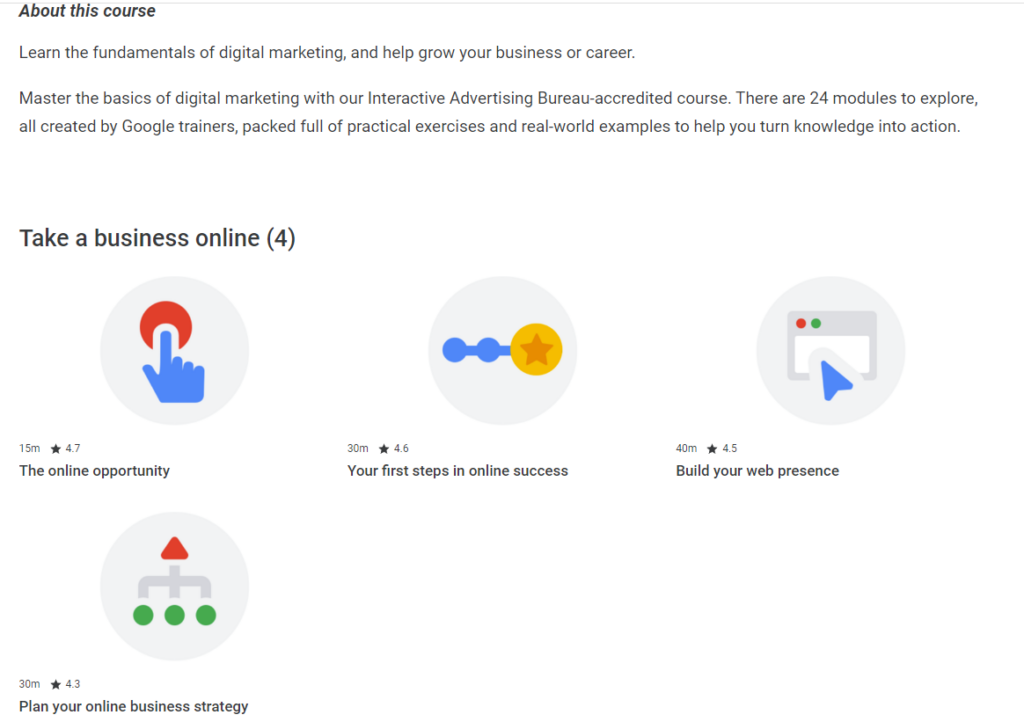
Google stands as a prominent figure in the digital realm, often considered the gateway between individuals and online businesses.
Regardless of opinions on Google’s extensive influence over the internet and online commerce, it serves as an excellent starting point for gaining foundational marketing knowledge.
Google Skillshop is particularly advantageous due to its accessibility, widespread recognition, and comprehensive content. It offers extensive resources covering both digital marketing strategies and various Google tools.
Given the likelihood of encountering Google’s website management tools, Skillshop provides an ideal starting point and a wealth of resources to support ongoing education tailored to individual needs.
If you’re keen on delving into search engine optimization (SEO) or search engine marketing (SEM) and ads, this is the ideal starting point.
Skillshop provides the foundational knowledge to develop expertise using Google’s tools and services. Completing final assessments also earns you certificates and awards that showcase your skills.
Experience Level:
Beginner.
Key Learning:
Course Duration:
40 hours.
Course Features:
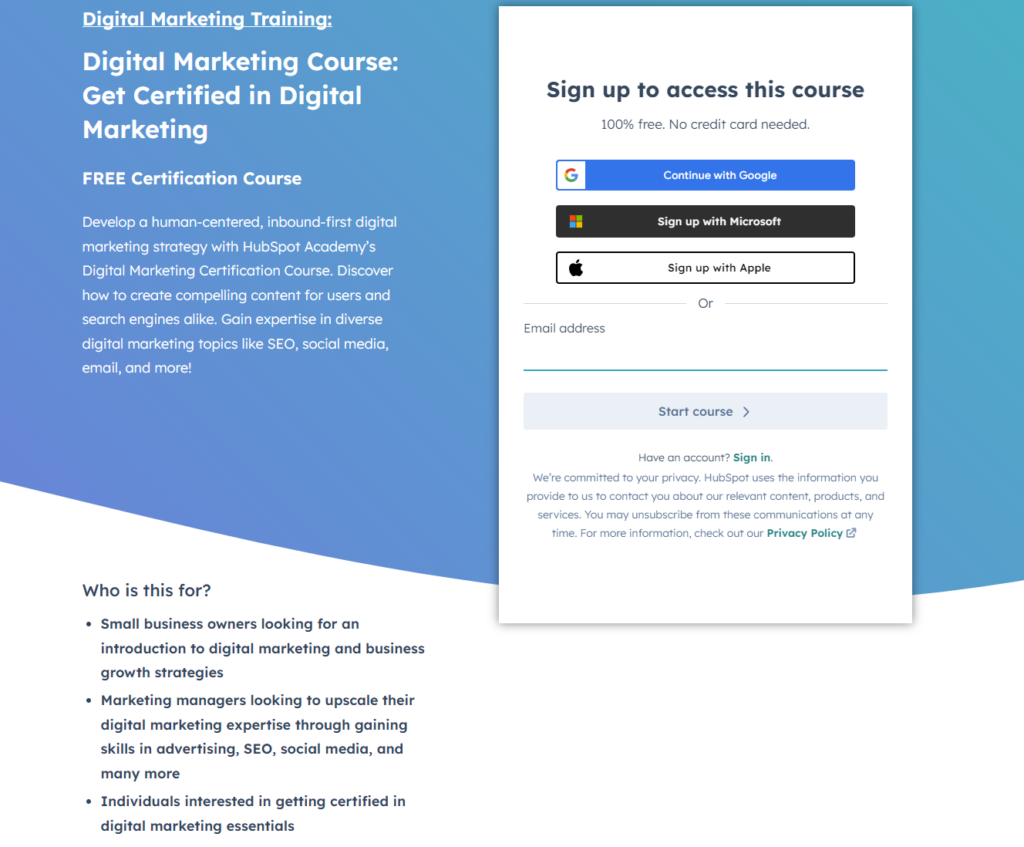
HubSpot is a major player in digital marketing, renowned for its expertise in “inbound” marketing strategies that emphasize customer relationship management and content strategy.
If your focus is on inbound marketing, which involves understanding customers and enhancing how websites contribute to customer acquisition, HubSpot is an excellent starting point.
Similar to Google, HubSpot’s courses concentrate on their specific service areas. This specialization ensures they offer deep expertise in their field. When you join their academy, HubSpot provides personalized recommendations tailored to your needs—an approach that underscores their commitment to personalization.
Being part of the HubSpot ecosystem offers a personalized learning journey. Observing how they structure lessons and content delivery can itself provide valuable insights into effective marketing strategies.
Observing how experts navigate an inbound platform can be enlightening if you pay attention to the details.
Although this course is brief, HubSpot Academy offers a wide range of digital marketing courses. It’s an excellent opportunity to develop your education continuously and enhance your skills throughout your career.
Experience Level:
Beginner.
Key Learning:
Course Duration:
5.25 hours.
Course Features:
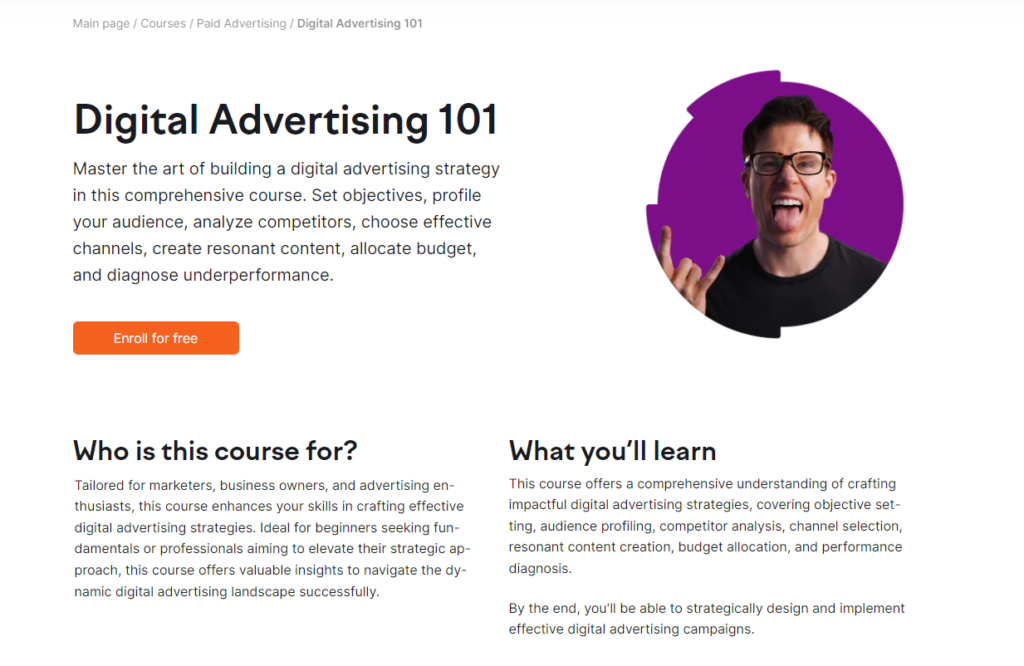
Semrush stands out as one of the largest tool companies in the SEO industry. If you’re aiming to dive into SEO research and analytics, this course provides an excellent starting point.
Expect a focused curriculum centered around devising strategies, budget planning, competitor analysis, and other data-driven practices.
With numerous guest instructors from various roles and businesses, you gain insights from a diverse range of industry professionals.
Similar to other courses offered by brand-specific platforms, Semrush focuses on its core business areas, ensuring you’re well-prepared for marketing tasks aligned with its tools.
This specialization is advantageous since encountering Semrush in your SEO-focused career is highly probable.
Although this specific course is brief, Semrush Academy offers numerous courses led by industry leaders like Kevin Indig.
There’s a wealth of content to explore, and the inclusion of various expert instructors enhances the appeal of this option.
Experience Level:
Beginner.
Key Learning:
Course Duration:
111 minutes.
Course Features:
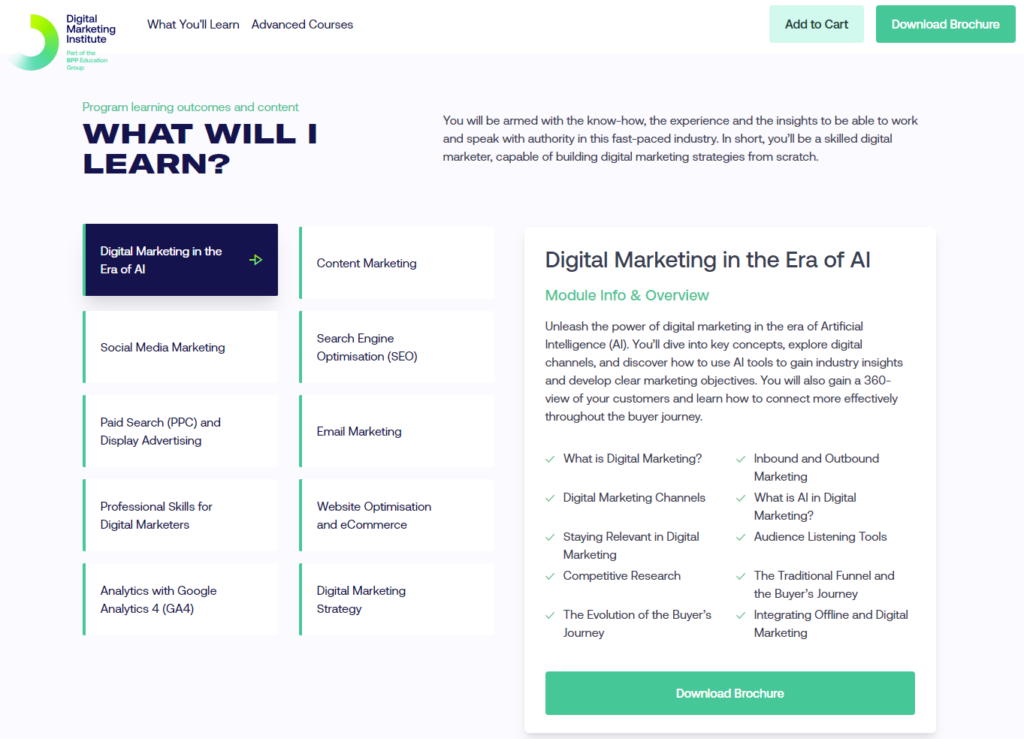
Unlike the free courses provided by individual marketing firms, DMI and AMA courses offer a more comprehensive approach across various platforms and topics.
You’ll engage with modules covering diverse tools and marketing practices, encompassing analytics, social media platforms, content creation, SEO, and AI. This exposure helps you make informed decisions about your specialization within marketing.
Paid course providers have a vested interest in staying updated with current trends, as evidenced by the AI-focused module highlighted earlier. However, it’s important to note that general marketing courses may not always feature cutting-edge technology. Updating and re-releasing courses to reflect changes in the field is a time-consuming process.
Investing in paid courses entails a significant upfront commitment. Determining whether they justify both the time and financial investment can be challenging.
A reliable approach is to seek out reviews and ongoing discussions about the course and the organization offering it. Engaging in conversations on social media platforms or forums allows you to gather insights from other professionals.
This process provides valuable information about teaching methodologies, assessment practices, and the overall learning experience shared by previous participants.
It’s advisable to conduct this research independently, beyond promotional landing pages. By leveraging firsthand accounts from those who have taken the course, you can evaluate whether it aligns with your learning preferences and career objectives.
Experience Level:
Beginner to intermediate.
Price Range:
$1,442 to $2,060.
Key Learning Areas:
Course Features:
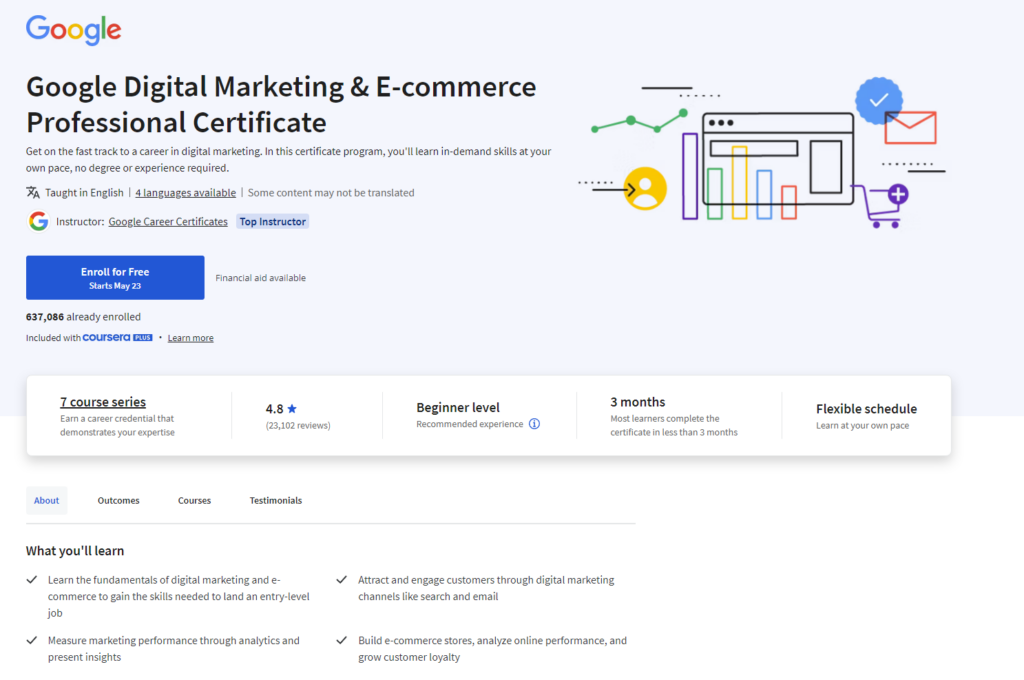
Coursera offers an intriguing platform where you gain access to courses through a monthly subscription fee. This model allows flexibility: instead of paying upfront for individual courses, you can explore different options without a significant financial commitment. If one course doesn’t meet your expectations, you can easily switch to another.
It’s worth noting that you can initially “enroll for free,” starting with a trial period. After the trial concludes, you’ll begin paying the subscription fee.
The Google course available on Coursera serves as an excellent starting point for newcomers. Although it spans a series of lessons, it remains accessible for beginners. By the end of the free trial, you can assess whether the course aligns with your learning goals.
Remember, the course duration shouldn’t be the sole factor influencing your decision in a subscription-based model. Continually evaluate the course’s quality and relevance to your objectives.
Ultimately, prioritize learning over the certificate. With a subscription model, it’s important to avoid the sunk cost fallacy; if a course becomes unengaging, pivot to fresh material that better suits your needs.
When evaluating the cost of the course, consider your monthly fee in relation to your expected completion rate. The platform suggests completing the course in three months, totaling $177 at $59 per month, requiring over 14 hours per week.
For a reduced weekly commitment of six hours, completion would extend to seven months, costing $413.
Experience Level:
Beginner.
Price:
You can start with a free trial period by “enrolling for free.” After the 7-day trial, the subscription costs $59 per month.
Key Learning Areas:
Course Duration:
Seven courses.
Each course spans 18 to 29 hours, totaling 170 hours.
Course Features:
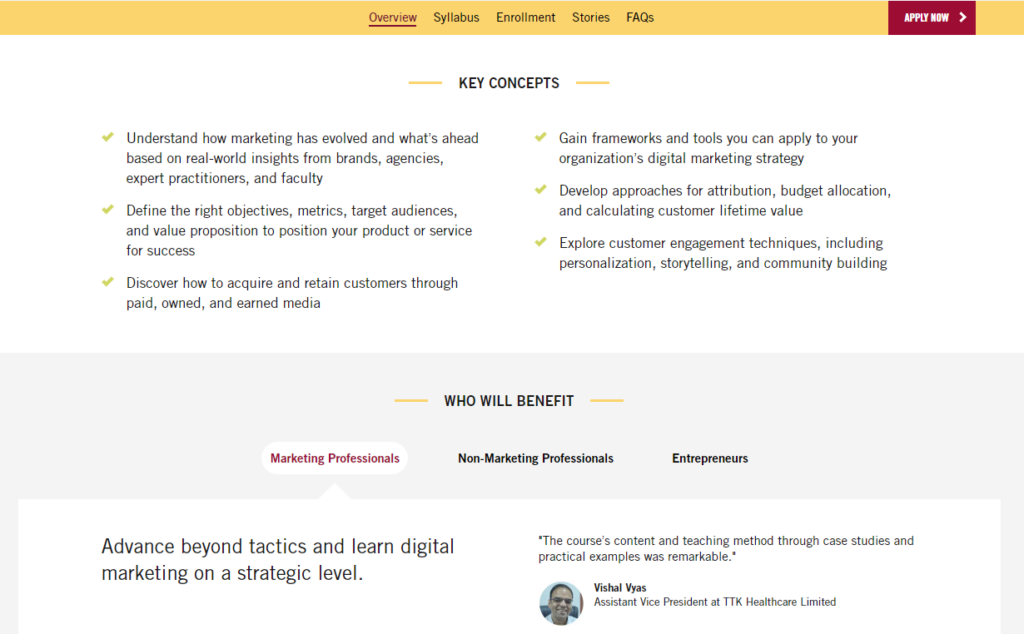
Obtaining a certification from an educational institution can significantly enhance your resume. Another advantage of such courses is the structured learning environment they provide.
If you prefer active learning over passive methods, courses offered by educational institutions are typically well-prepared and taught by professional educators. Education itself is a skill, and courses led by faculty and industry experts often offer a richer learning experience.
Educational institutions also tend to offer robust learning platforms and community features that support your learning journey. Investing upfront in a course from a reputable educational institution can provide assurance that you’ll derive value from the experience.
This course emphasizes practical examples, bridging theoretical knowledge with real-world applications.
However, it’s important to note that educational institutions may be slower to adapt to digital trends. Therefore, the course’s value hinges heavily on the expertise and relevance of the practitioners involved.
One notable aspect of this course is its significantly more structured approach compared to the six-month course discussed earlier. This structured approach can actually be advantageous.
Careful planning and meticulous selection of materials can enhance the learning experience, benefiting from the expertise of course developers experienced in syllabus design.
Experience Level:
Beginner to intermediate.
Price:
$1,850.
Key Learning Areas:
Course Duration:
Seven weeks.
6 to 7 hours per week.
Course Features:
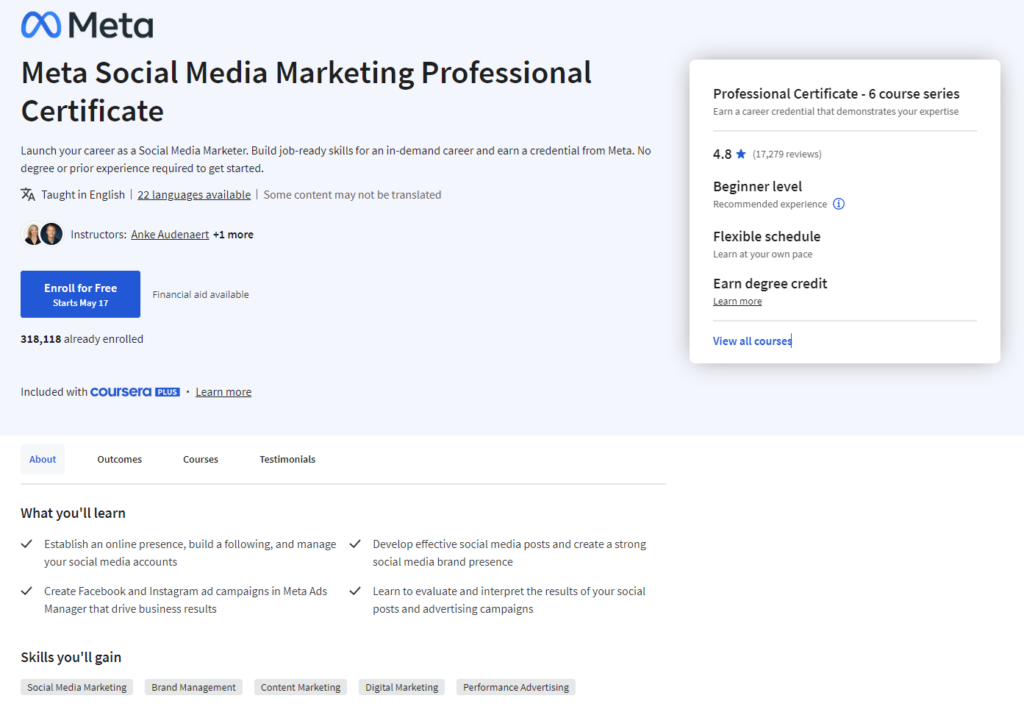
This Coursera course, offered by Meta, shares similarities with the Google Coursera course we discussed earlier.
Focused specifically on social media, it doesn’t provide a comprehensive overview of digital marketing as a whole. However, it does offer in-depth insights into social media management and brand strategies from one of the industry’s leading giants.
Facebook, known for its enduring popularity, is a cornerstone of Meta’s portfolio, which includes other successful platforms and initiatives.
In addition to covering organic social media topics, the course delves into paid advertising. If your interest lies in paid media, this course could prove invaluable.
As with any course, the time commitment required to complete the modules may vary. Notably, not all modules provide time estimates, so it may be prudent to consider this course once you’ve determined if Coursera meets your learning needs and preferences.
Experience Level:
Beginner.
Price:
You can start with a free trial period by “enrolling for free.” After the 7-day trial, the subscription costs $59 per month.
Key Learning Areas:
Course Duration:
Six-course series.
Each course ranges from 10 to 20 hours, with some courses lacking exact hour estimates.
Course Features:
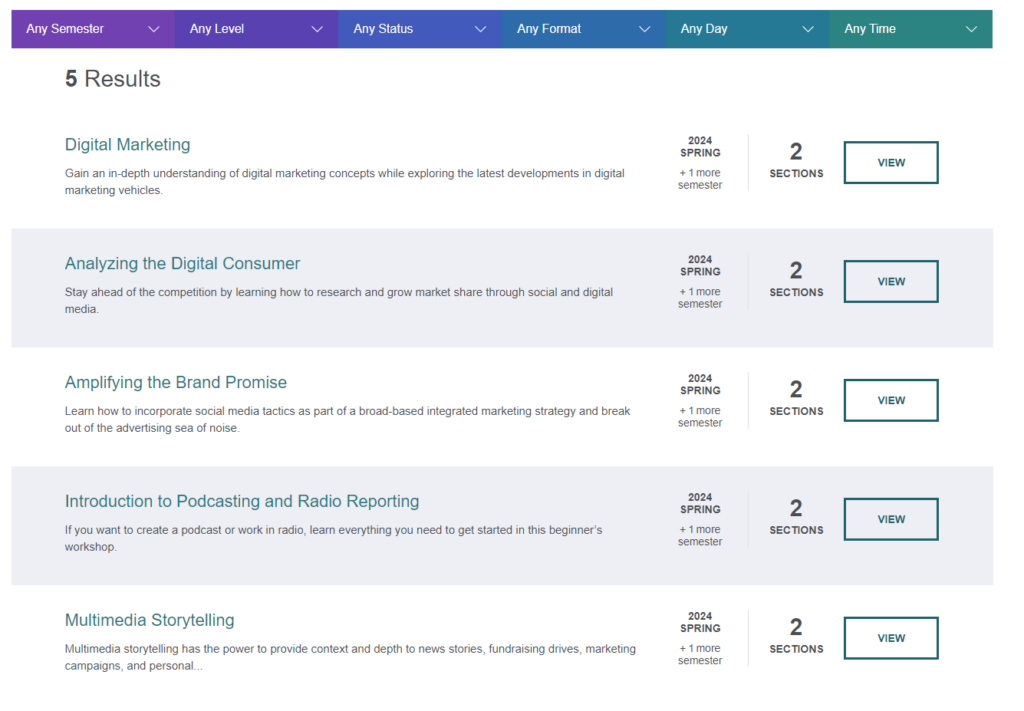
Please note: Courses tend to fill up quickly, so you may need to wait for the next semester to enroll.
This course follows a structure akin to traditional college courses but offers open enrollment.
Unlike the Harvard course mentioned earlier, this course provides many of the advantages associated with formal education.
The courses are divided into sections with limited enrollment slots, indicating careful planning to accommodate learners’ needs. This structure fosters more interactive learning compared to courses that rely primarily on video content.
These courses are conducted live and follow a set schedule throughout the semester. The benefits of live sessions include participating in real-time lectures and active learning opportunities.
Additionally, you’ll join a community of fellow students for collaboration, and your instructor may be available for direct interaction during designated times.
One drawback of this format is its potential conflict with your schedule, limiting your ability to learn at your preferred pace. It requires a strict commitment to derive value from the investment.
Experience Level:
Beginner to intermediate.
Price Range:
$400 to $1,000 per course.
Key Learning Areas:
Course Duration:
Each course spans one semester.
Course Features:
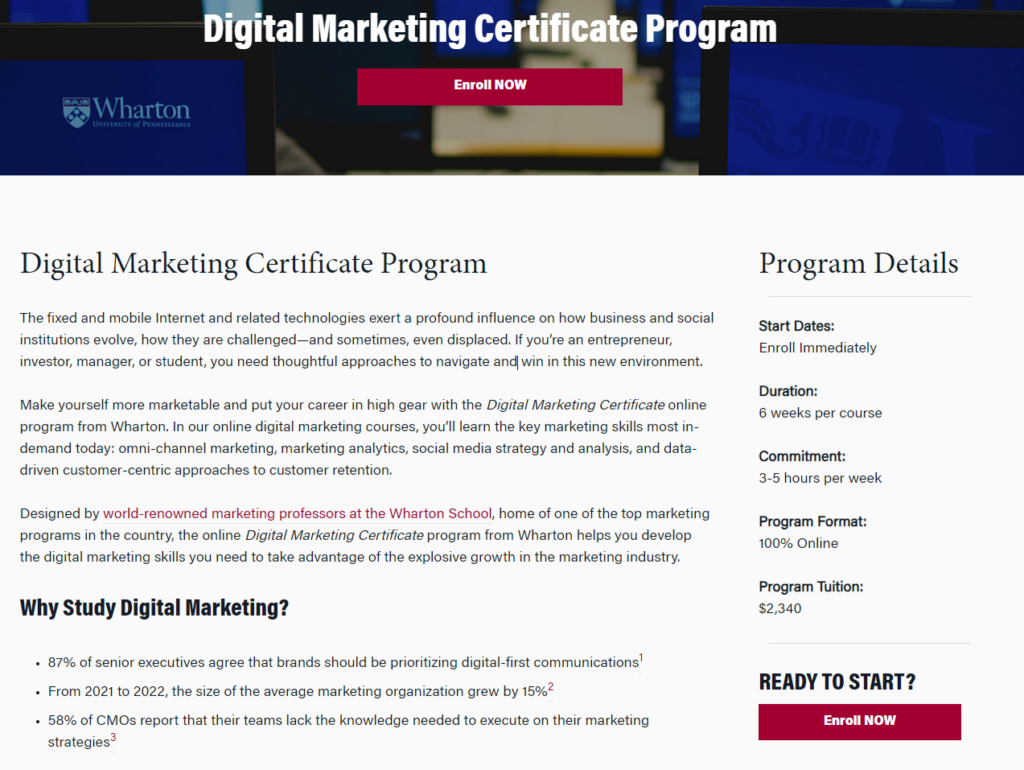
The Wharton program, offered by a college, provides a certificate upon completion—a valuable addition to your resume, especially if you lack relevant or recent experience.
Enrollment is immediate, and the course requires a small weekly time commitment, making it ideal for busy individuals.
However, it is notably more expensive compared to other courses on this list. Being an on-demand course means you won’t have access to the same college-style benefits as those offered by NYU.
This course emphasizes business and business management content more than others. It’s beneficial for brushing up on business fundamentals but may not be as suitable if you’re seeking deep immersion in digital marketing.
The program prioritizes analysis, leveraging the strong business background of the college to enhance your data analysis skills. This focus makes it an excellent choice if you’re pursuing a data-centric career path.
Experience Level:
Beginner to intermediate.
Price:
$2,340.
Key Learning Areas:
Course Duration:
Six weeks.
3 to 5 hours per week.
Course Features:
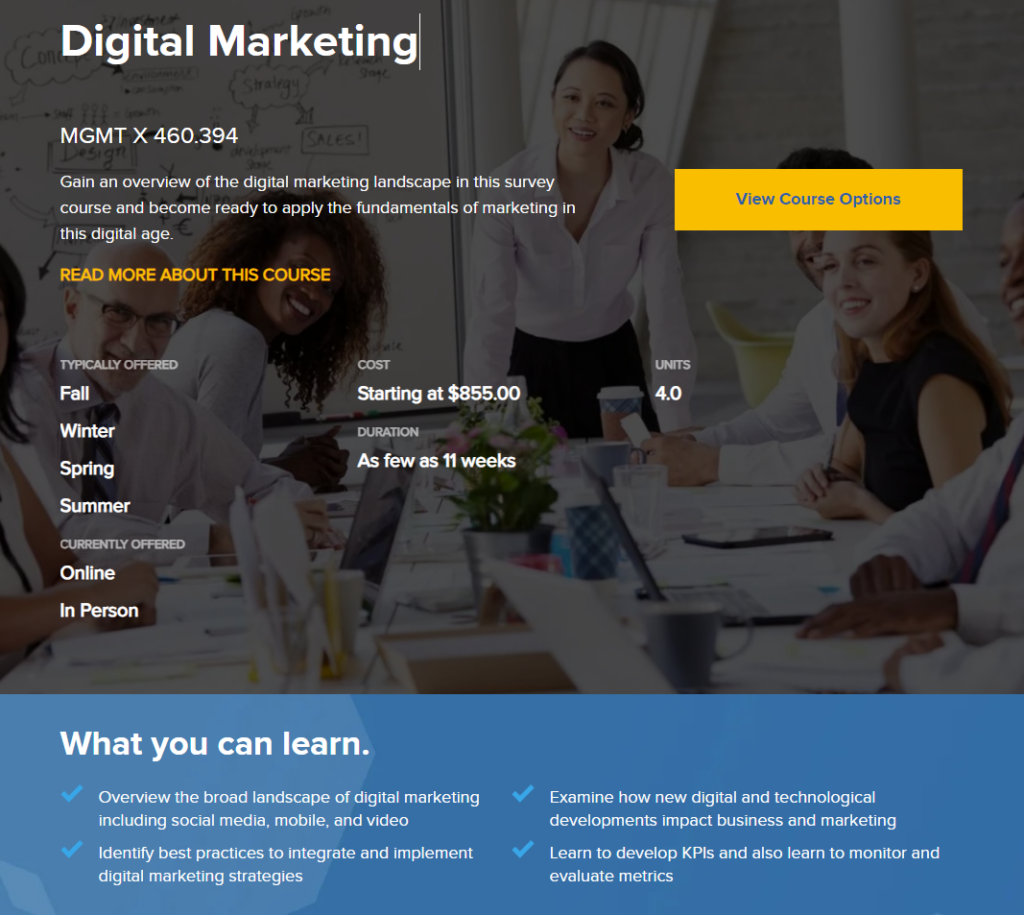
Please ensure you apply for the online course if attending an in-person class isn’t feasible for you.
Similar to the NYU course, this offering follows a traditional college-level format, both in terms of pricing and organization. Don’t judge its value solely based on its price; it maintains standards comparable to other college courses.
The online format of this course doesn’t have scheduled meeting times, which enhances accessibility compared to the NYU course. However, it retains a structured approach typical of college courses.
Taught by a marketing executive, it combines the rigor of college-level education with insights from an industry expert—a blend of academic and practical knowledge.
For a preview of the course content and required readings, you can review the syllabus provided at the bottom of the course page.
While specific weekly time commitments aren’t detailed, the 11-week duration offers a comprehensive learning experience across various topics.
Experience Level:
Beginner.
Price:
Starting at $855.
Key Learning Areas:
Course Duration:
11 weeks.
Course Features:
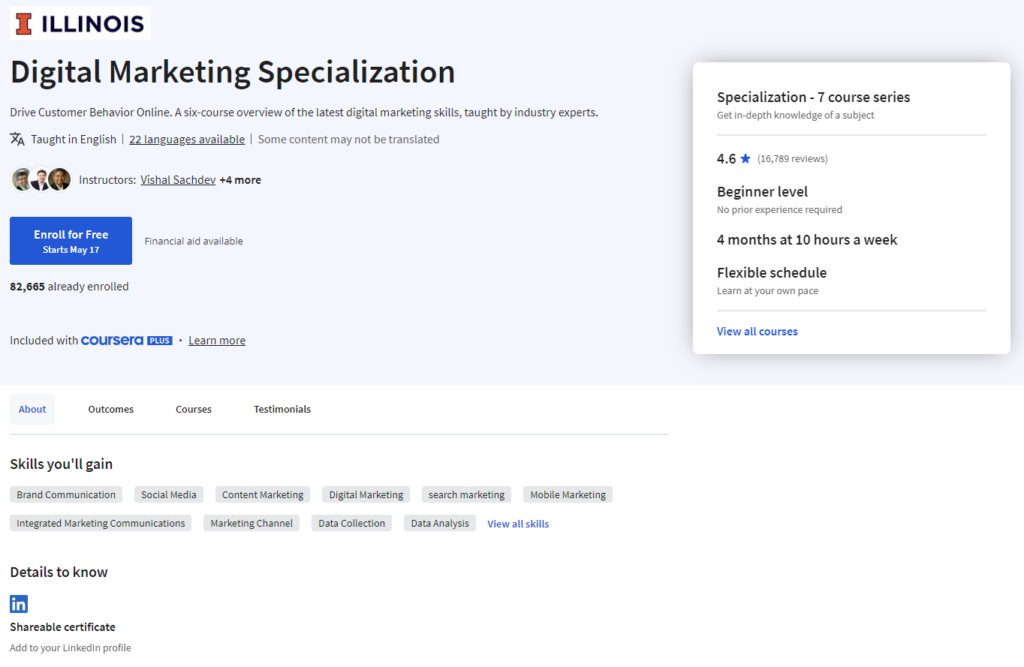
Concluding our list is a college offering a course series on Coursera. Similar to other Coursera offerings, this course is divided into several sub-courses, most spanning around 20 hours each.
As with other courses, the actual cost of this course depends on your weekly commitment and completion rate. Estimated at four months, it totals $236. With a reduced commitment of six hours per week, it extends to six months and costs $354.
This series provides a comprehensive introduction to fundamental concepts, making it ideal for those new to digital marketing or marketing in general. Beginning with foundational modules, it progresses through the evolution and practical application of digital marketing strategies.
The series is meticulously planned, guiding learners methodically to build knowledge and skills in a structured manner. It starts with an introduction to analytics theory, followed by a module focused on applying analytics in real-world scenarios. This approach ensures a thorough understanding of core concepts followed by practical implementation.
Whether you are starting fresh or already familiar with basic concepts, this course series offers a well-organized and informative starting point for your digital marketing journey.
Similar to the Google Coursera course, this is an excellent option to consider using your free trial on.
Experience Level:
Beginner.
Price:
You can start with a free trial period by “enrolling for free.” After the 7-day trial, the subscription costs $59 per month.
Key Learning Areas:
Course Duration:
Seven courses.
Each course spans 13 to 28 hours, totaling 145 hours in total.
Course Features:
Original news from SearchEngineJournal